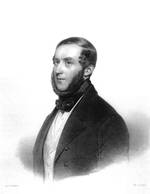Alexander Levin von Bennigsen
Alexander Levin Count von Bennigsen (born July 21, 1809 in Zakret near Vilnius , † February 27, 1893 in Banteln ) was a Hanover statesman.
Life
He comes from the Bennigsen family ; his father was General Levin August von Bennigsen and his mother Marie Leonarde von Andrzeykowicz. In 1818 he came to Hanover with his father, where he attended the Ratsgymnasium . From 1826 he studied law at the University in Göttingen and entered 1830 in the Hanoverian government service from which he resigned because of ill health again. 1840 In 1841, the provincial landscape of the principalities of Calenberg , Göttingen and Grubenhagen elected him to the treasury, with which he also became a member of the First Chamber of the State Assembly of the Kingdom of Hanover as well as of the Obersteuerenkollegium and the General Directorate of Indirect Taxes.
On March 20, 1848, King Ernst August I commissioned him with the formation of a new ministry, in which he received the portfolio of foreign affairs and the royal house as well as the chairmanship. In February 1850 he was sent “Subject of German Affairs” to the court of Emperor Franz II in Vienna ; but he had to leave without having achieved anything.
On October 28, 1850, he received the release that he and his colleagues had repeatedly requested. Even after the same he did not stay away from state affairs and, as a member and as President of the First (later the Second) Chamber, tried to mediate between the reactionary desires of the ministry and the demands of the liberals. But when he entered into decisive opposition to the government in some matters, such as the elimination of domains, which affected the monarch's most personal interests , he fell into complete disgrace with the king and also saw himself out of the chamber on the basis of the decree of 14. January 1857, which stipulated that the retired ministers of state should also be asked to take leave. The pre-synod of 1863 elected him its president. From 1881 to 1884 he was a member of the Reichstag for the German-Hanover Party and the constituency of Hanover 10 ( Hildesheim ). In 1864 the capital sent him to represent it in the Second Chamber, which again gave him the chairmanship.
In Göttingen he became a member of the Corps Lunaburgia II in 1827 .
literature
- The two Bennigsen . In: The Gazebo . Issue 16, 1863, pp. 256 ( full text [ Wikisource ]).
Web links
- Count Bennigsen, Alexander Levin in the database of members of the Reichstag
- Biography of Alexander Lewin Graf-Comte Bennigsen . In: Heinrich Best : database of the members of the Reichstag of the Empire 1867/71 to 1918 (Biorab - Kaiserreich)
- Alexander Levin Bennigsen in the database of Find a Grave (English)
Individual evidence
- ^ Fritz Specht, Paul Schwabe: The Reichstag elections from 1867 to 1903. Statistics of the Reichstag elections together with the programs of the parties and a list of the elected representatives. 2nd Edition. Verlag Carl Heymann, Berlin 1904, p. 123.
- ^ Kösener corps lists 1910, 79 , 88
| personal data | |
|---|---|
| SURNAME | Bennigsen, Alexander Levin from |
| ALTERNATIVE NAMES | Bennigsen, Alexander Levin Count of |
| BRIEF DESCRIPTION | Hanoverian statesman, MdR |
| DATE OF BIRTH | July 21, 1809 |
| PLACE OF BIRTH | Zakret near Vilnius , Lithuania |
| DATE OF DEATH | February 27, 1893 |
| Place of death | Dumbbells |
